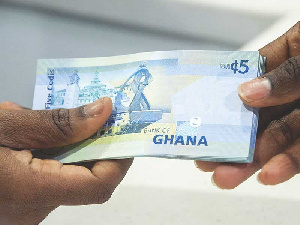After three months’ victory over the wrestle with its major trading currency, the US dollar, the cedi finally lost its valour and entered into depreciating mode, as it has succumbed to the threat from the devastating impact of the coronavirus pandemic.
The local currency was on top of its game in the first quarter of the year as it appreciated 1.22 percent at the end of January, 4.48 percent at the end of February, and 1.66 percent at the end of March 2020 (using Bank of Ghana mid-rate figures), recording three months’ consecutive gains against the US dollar, a feat that has not been achieved in memorable recent past.
The robust performance of the cedi, according to Data Bank Research, was buoyed by strong offshore buying of cedi-denominated assets, weak corporate demand for FX, as well as sustained support from the Bank of Ghana on the spot and forward markets.
Again, the research adds, the US$3 billion Eurobond inflow in late February-2020 further boosted investor confidence in the cedi’s strength despite the near-term election-related risks.
Currently, per figures from Bank of Ghana, the cedi’s average value to a dollar is GH¢5.60 compared to GH¢5.52 in February – the very month it recorded its highest appreciation against the dollar. The fast spread of the coronavirus, exacerbated by the sharp fall in crude oil prices, triggered capital flight by foreign portfolio investors across developing economies, thereby, putting pressure on the local currency; hence, wiping all gains it made against the dollar in the first quarter.
Outlook
Even though the virus is said to have come to stay for a long time, thereby, continuing to pose threat to the recuperation of the cedi, analysts believe the landing of the US$1 billion IMF cash will help the local currency gain some stability against the US dollar.
“The recent approval of US$1 billion by the IMF for Ghana’s COVID-19 responses should also provide forex inflows to shore up the country’s foreign currency reserves. This would significantly enhance the Bank of Ghana’s capacity to support the Cedi against extreme shocks. We expect these developments to mitigate the pressure on the Ghana Cedi in quarter two of 2020,” the Data Bank Research commented.
Director of the Institute of Social, Statistics and Economic Research (ISSER) at the University of Ghana, Prof. Peter Quartey, also underscored this point in an earlier interview with the B&FT, saying: “With the US$1 billion from IMF, it will add to the supply of foreign currency and hopefully bring down the exchange rate.”
The Economist Intelligence Unit, on the other hand, said in its April Country Report that it expects the cedi to continue to be subdued by the dollar due to heightened uncertainty about the 2020 elections.
“In line with other emerging market currencies, we expect the cedi to remain weak in the face of heightened global risk perceptions – which, in Ghana’s case, will be accentuated by increasing uncertainty ahead of the December 2020 elections.”
Source: B&FT Online
 Home Of Ghana News Ghana News, Entertainment And More
Home Of Ghana News Ghana News, Entertainment And More





